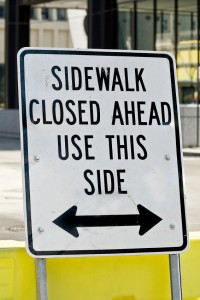Everybody has heard the familiar axiom that “The three most important things in real estate are location, location, and location.” The same is true for SEO (Search Engine Optimization), where your “location” is your domain name. It’s one of the most important aspects of optimization and there are four common mistakes that hurt your website’s ranking.
Let’s use the real estate metaphor to describe them…
1) You’re a Squatter
In the real estate sense, squatting refers to setting up residence in a home you don’t own. The Internet equivalent is setting up your website as a subdomain that belongs to someone else. For example, jondipietro.wordpress.com. There are a couple of reasons this is a bad idea. First, you never build any search authority because it all belongs to the domain (wordpress.com) and not the subdomain. In other words, there is very little difference between “jondipietro.wordpress.com” and “elmerjfudd.wordpress.com”. Another reason this can be dangerous is that you could (theoretically) be evicted at any time. While the risk may be low for a site like “wordpress.com”, just ask Ning users how that worked out for them.
Solution: Find and buy a domain (but see below first). You can purchase .com domains for about $11 per year and most hosting services (WordPress included) support using your own domain name on their platform.
2) You’re Subdividing
While this is usually a positive thing in real estate, it’s terrible for SEO. This means having separate domains for your company and other related sites, which could include things like blogs, events, or products. For example, let’s say I planned on launching a whole separate web site for “Inbound Marketing Workshops.” I could host the site at “inboundmarketingworkshops.com” or use a subdomain like “workshops.domesticatingit.com”. There are advantages to the first method – it is keyword rich, for one thing. But there is a big problem too. When I launch the site, it will have zero juice. I would have to build it all from scratch because it is a brand new domain with no inbound links and no authority. However, by making it a subdomain, I gain the benefits of two years of SEO from “domesticatingit.com”. The converse is true as well: as the new site builds traffic and links, it will benefit the overall optimization of the domain.
Solution: Generally, though not exclusively, it’s a better idea to create a subdomain and point it at your new web site so that you can leverage any existing search quality and authority.
 3) Your Sign Stinks
3) Your Sign Stinks
Let’s face it – registering a short, memorable, descriptive, keyword-rich domain name is difficult, if not impossible these days. There are so many domains in existence, registering yours always involves trade-offs. So what constitutes a stinky sign? Well, it could be confusing by including words that aren’t part of your optimization strategy. For example, if you include the word “Boston” because that’s where your office is then you’re essentially telling search engines that you’re a local business; which may or may not be the case. Another factor is getting the words in the best order. Google gives less weight to every word in a URL or page title, so the further you go in a domain name, the less valuable the word is.
Solution: Leave out words that don’t target the search keywords for your business, and try to keep the most important words as close to the left as possible.
4) You’re Slumming
This last one’s a little controversial as the consensus is somewhat split in the SEO community. The idea here is that if you set up shop in a run down part of town, people will tend to think less of your business. The Internet equivalent here is having a “low rent” TLD (Top Level Domain) like .info. At issue here is the fact that these TLDs are so cheap that they are frequently used by spammers, but it’s not entirely clear whether or how much that hurts SEO.
Solution: In my humble opinion, it’s better to be safe than sorry.
